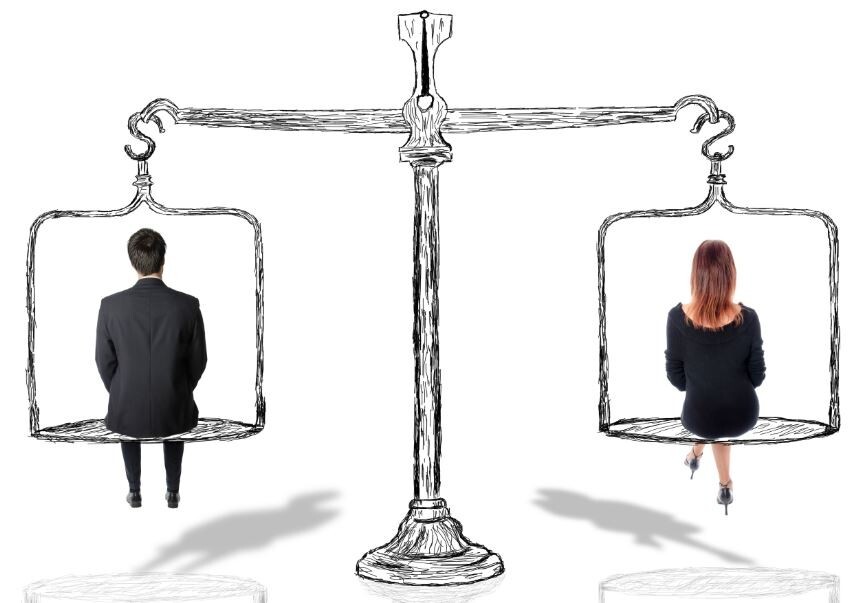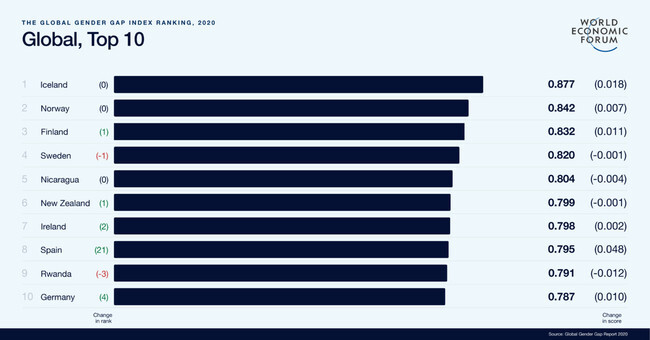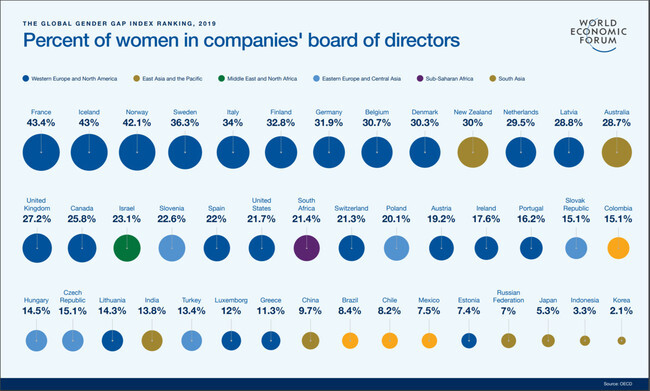hankyoreh
Links to other country sites 다른 나라 사이트 링크
Gender gap in all areas globally won’t be resolved for another 99.5 years, WEF study says

While announcements of female prime ministers have become more commonplace in countries such as Finland, Norway, and New Zealand, another 99.5 years will be needed for the gender gap to be resolved in all areas around the world, a study predicts. While the date has been moved up slightly from last year’s forecast of 108 years, observers stressed the need for more efforts to lay the groundwork for gender equality. South Korea placed below China at 108th in a “gender gap” ranking of countries as an indicator of gender equality.
The World Economic Forum (WEF) recently published findings from an analysis of gender-based disparities in 153 countries, the AFP reported on Dec. 16. For the report, statistics for four areas -- participation in and opportunities for economic activity, educational attainment, health and life expectancy, and political rights -- were used to develop indicators for the gender gap, with values closer to one representing greater levels of gender equality.
Improvements in the gender gap from last year were attributed to increased participation by women in politics. According to the report, the percentage of female membership in parliaments around the world stood at 25.2% this year, while the percentage of women in cabinet positions was 21.2% -- both levels up slightly from respective values of 24.1% and 19% last year. The projected period of time needed to resolve the gender gap in the area of politics was reduced by 12 years from 107 years in 2018.

But in the area of economy, the gender gap actually increased. Globally, the percentage of women aged 15 to 64 participating in the labor market stood at 55%, far below the 78% rate for men. In connection with this, the report remarked on the continued low rate of women’s representation in management and leadership positions, as well as a serious blow to retail industries employing a high percentage of female workers as a result of automation and other forms of technological change. The report concluded that another 257 years would be needed for the gender gap to be resolved in economic terms -- 55 years longer than was predicted last year.

Among the 153 countries examined, Iceland showed the smallest gender gap, with a global gender gap index (GGI) score of 0.877. It was followed by other Northern European countries, including Norway (0.842), Finland (0.832), and Sweden (0.82). South Korea’s GGI score of 0.672 placed it 108th overall, which was seven spots up from 2018 but still two rungs below China in 106th. Japan ranked 13 spots below South Korea in 121st place.
By Lee Jung-ae, staff reporter
Please direct comments or questions to [english@hani.co.kr]

Editorial・opinion
![[Column] Season 2 of special prosecutor probe may be coming to Korea soon [Column] Season 2 of special prosecutor probe may be coming to Korea soon](https://flexible.img.hani.co.kr/flexible/normal/500/300/imgdb/original/2024/0426/3317141030699447.jpg) [Column] Season 2 of special prosecutor probe may be coming to Korea soon
[Column] Season 2 of special prosecutor probe may be coming to Korea soon![[Column] Park Geun-hye déjà vu in Yoon Suk-yeol [Column] Park Geun-hye déjà vu in Yoon Suk-yeol](https://flexible.img.hani.co.kr/flexible/normal/500/300/imgdb/original/2024/0424/651713945113788.jpg) [Column] Park Geun-hye déjà vu in Yoon Suk-yeol
[Column] Park Geun-hye déjà vu in Yoon Suk-yeol- [Editorial] New weight of N. Korea’s nuclear threats makes dialogue all the more urgent
- [Guest essay] The real reason Korea’s new right wants to dub Rhee a founding father
- [Column] ‘Choson’: Is it time we start referring to N. Korea in its own terms?
- [Editorial] Japan’s rewriting of history with Korea has gone too far
- [Column] The president’s questionable capacity for dialogue
- [Column] Are chaebol firms just pizza pies for families to divvy up as they please?
- [Column] Has Korea, too, crossed the Rubicon on China?
- [Correspondent’s column] In Japan’s alliance with US, echoes of its past alliances with UK
Most viewed articles
- 1After election rout, Yoon’s left with 3 choices for dealing with the opposition
- 2AI is catching up with humans at a ‘shocking’ rate
- 3Noting shared ‘values,’ Korea hints at passport-free travel with Japan
- 4Two factors that’ll decide if Korea’s economy keeps on its upward trend
- 5Why Kim Jong-un is scrapping the term ‘Day of the Sun’ and toning down fanfare for predecessors
- 6South Korea officially an aged society just 17 years after becoming aging society
- 7Korea’s 1.3% growth in Q1 signals ‘textbook’ return to growth, says government
- 8Is Japan about to snatch control of Line messenger from Korea’s Naver?
- 91 in 5 unwed Korean women want child-free life, study shows
- 10[Reportage] On US campuses, student risk arrest as they call for divestment from Israel